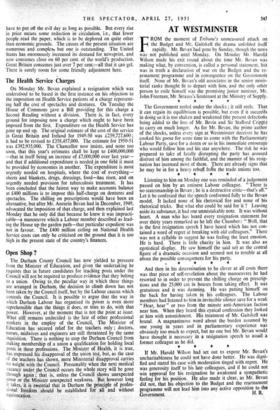AT WESTMINSTER
FROM the moment of Tribune's unmeasured attack on the Budget and Mr. Gaitskell the drama unfolded itself rapidly. Mr. Bevanhad gone by Sunday, though the news was not published until Monday. On Monday Mr. Harold Wilson made his exit round about the time Mr. Bevan was making what, by convention, is called a personal statement, but was in truth a declaration of war on the Budget and the re- armament programme and in consequence on the Government itself. None of Mr. Bevan's old associates in the senior minis- terial ranks thought fit to depart with him, and the only other person to exile himself was the promising junior minister, Mr. John Freeman. Mr. Strauss's lieutenant at the Ministry of Supply. * * * * The Government reeled under the shocks ; it still reels. That it can regain its equilibrium is possible, but even if it succeeds in doing so it is too shaken and weakened (the present defectiofis being added to the loss of Mr. Bevin and Sir Stafford Cripp§) to carry on much longer. As for Mr. Bevan, the prime author of the shocks, unless every sign at Westminster deceives he has cooked his goose for some time to come with the Parliamentary Labour Party, save for a dozen or so in his immediate entourage who would follow him and his star anywhere. The risk he was prepared to take of fatally disrupting the party has aroused distrust of him among the faithful, and the manner of his resig- nation has incensed most of them. There arc already signs that be may be in for a heavy rebuff irdin the trade unions too. * * * * Listening to him on Monday one was reminded of a judgement passed on him by an eminent Labour colleague. ' There is no statesmanship in Bevan ; he is a destructive critic—that's all." Let it be confessed that the speech conformed fully to the Bevan model. It lacked none of his rhetorical fire and none of his rhetorical tricks. But what else could be said for it ? Leaving aside its substance, it had one unmistakable note. It was without heart. A man who has heard every resignation statement for over thirty years remarked as he left the Chamber: "Well, that is the first resignation speech I have heard which has not con- tained a word of regret at breaking with old colleagues." There was not a syllable to suggest he was feeling the least emotion. He is hard. There is little charity in him. It was also art egotistical display. He saw himself (he said so) as the central figure of a dramatic occasion and seemed not to trouble at all about the possible consequences for his party. • * * * * And then in his determination to be clever at all costs there was that piece of self-revelation about the manoeuvres he had resorted to in order to prevent the shilling charge on prescrip- tions and the 25,000 cut in houses from taking effect. It was gratuitous and it was damning. He was patting himself on the back for having taken in his colleagues. The Labour members had listened to him in invincible silence save for a weak " Hear. hear" or two from the minute anti-American faction near him. When they heard this cynical confession they looked at him with astonishment. His treatment of Mr. Gaitskell was brutal. A magnanimous word about the burden assumed by one young in years and in parliamentary experience was obviously too much to expect, but no one but Mr. Bevan would have thought it necessary in a resignation speech to assail a former colleague as he did. * * * * If Mr. Harold Wilson had set out to expose Mr. Bevari's uncharitableness he could not have done better. He was digni- fied and stated his case with moderation tinged with regret. He was generosity itself to his late colleagues. and if he could not win approval for his resignation he awakened a sympathetic feeling for his position. He also made it clear, as Mr. Bevan did not, that his objection to the Budget and the rearmament programme will not lead him into any active opposition to the Government. H. B.


































 Previous page
Previous page